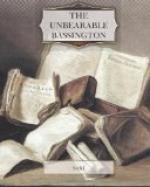“Charming, certainly,” said Keriway, “but too full of the stress of its own little life struggle to be peaceful. Since I have lived here I’ve learnt, what I’ve always suspected, that a country farmhouse, set away in a world of its own, is one of the most wonderful studies of interwoven happenings and tragedies that can be imagined. It is like the old chronicles of medieval Europe in the days when there was a sort of ordered anarchy between feudal lords and overlords, and burg-grafs, and mitred abbots, and prince-bishops, robber barons and merchant guilds, and Electors and so forth, all striving and contending and counter-plotting, and interfering with each other under some vague code of loosely-applied rules. Here one sees it reproduced under one’s eyes, like a musty page of black-letter come to life. Look at one little section of it, the poultry-life on the farm. Villa poultry, dull egg-machines, with records kept of how many ounces of food they eat, and how many pennyworths of eggs they lay, give you no idea of the wonder-life of these farm-birds; their feuds and jealousies, and carefully maintained prerogatives, their unsparing tyrannies and persecutions, their calculated courage and bravado or sedulously hidden cowardice, it might all be some human chapter from the annals of the old Rhineland or medieval Italy. And then, outside their own bickering wars and hates, the grim enemies that come up against them from the woodlands; the hawk that dashes among the coops like a moss-trooper raiding the border, knowing well that a charge of shot may tear him to bits at any moment. And the stoat, a creeping slip of brown fur a few inches long, intently and unstayably out for blood. And the hunger-taught master of craft, the red fox, who has waited perhaps half the afternoon for his chance while the fowls were dusting themselves under the hedge, and just as they were turning supper-ward to the yard one has stopped a moment to give her feathers a final shake and found death springing upon her. Do you know,” he continued, as Elaine fed herself and the mare with morsels of currant-loaf, “I don’t think any tragedy in literature that I have ever come across impressed me so much as the first one, that I spelled out slowly for myself in words of three letters: the bad fox has got the red hen. There was something so dramatically complete about it; the badness of the fox, added to all the traditional guile of his race, seemed to heighten the horror of the hen’s fate, and there was such a suggestion of masterful malice about the word ‘got.’ One felt that a countryside in arms would not get that hen away from the bad fox. They used to think me a slow dull reader for not getting on with my lesson, but I used to sit and picture to myself the red hen, with its wings beating helplessly, screeching in terrified protest, or perhaps, if he had got it by the neck, with beak wide agape and silent, and eyes staring, as it left the farmyard for ever.




